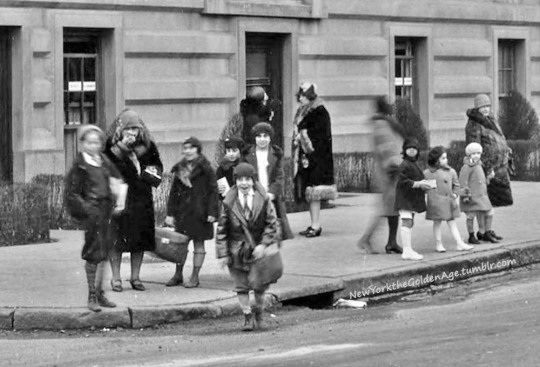#leaving school
Explore tagged Tumblr posts
Text

Children and mothers leaving an elementary school, Grand Concourse and East Tremont Avenue, the Bronx, March 4, 1929 (detail).
Photo: Al Ponte's Time Machine-NY, Facebook
#vintage New York#1920s#schoolchildren#school#vintage Bronx#March 4#4 March#street photography#leaving school
42 notes
·
View notes
Text

Indonesia, 1990 Lake Toba, Sumatra, Indonesia. インドネシア スマトラ島 トバ湖 Photography by Michitaka Kurata
#indonesia#sumatra#lake toba#boy#boys#student#elementary school student#school#leaving school#photography#photographers on tumblr#black and white photo#b&w#film#35mm#35mm film#kodak#nikon#1990#インドネシア#スマトラ島#トバ湖#少年#小学生#下校#白黒写真#白黒フィルム#モノクロフィルム#モノクロネガフィルム
103 notes
·
View notes
Text
So tomorrow is my last day at my school. And I’m having the violent urge to show up out of uniform as a big and final “Fuck you”
6 notes
·
View notes
Text
It's kind of crazy to me how Schools just over now, I saw it coming a mile a way, I am 18 after all but its just really hitting me how it's over now. I'm never going back.
I have been in school for 12 years now or 66% of my entire life and now ITS JUST GONE. That's an ENORMOUS status quo change and I don't get how other people aren't more freaked out over it.
Way way WAYYYY back then in Primary (or Elementary for the Americans) School I was so excited for the future, what I was going to do once I got out of school, stuff like that.
Then time went on, and on, and on. Overtime I just stopped caring about what was going to happen in the future as I had spent so long in School I just resigned to my fate, it felt like I was never going to get out so I made peace with that fact.
Now here I am, out of school despite everything. This isn't even mentioning some far more serious stuff. Its just feels impossible that I'm really here. Idk where to go from now.
#school#thinking thoughts#shower thoughts#leaving school#teenagers#personal essay#essay thingy#putting in as many tags as I can as I will be dissapointed if nobody responds to this#high school#middle school#elementary school#Me saying Primary school is because i'm irish and not british
7 notes
·
View notes
Text
i have officially left sixth-form, and i feel heartbroken and empty. i feel so alone and small and scared, and i miss my teachers. i feel so much grief, and nobody understands that i am actually undergoing the process of grieving. i've never felt this sad about something. nothing has meant as much to me as my relationship with that one teacher, and the experiences i've had at that secondary school. i was there for seven years. that teacher is the first adult to make me feel safe, and believes in me like no other. she knows how self-critical i am, and would always be in my corner rooting for me when i had no one else. i don't know what i'm supposed to do without her. she celebrated my every achievement, no matter how small it was. no matter how seemingly irrelevant it was. she was the only adult in my life to listen and understand and appreciate me for me. i have never felt so alone in my life. i can't believe it's all over. :((
#academic validation#emotional attachment#english teacher#a levels#leaving school#university#favourite person#favourite teacher#loneliness#anxiety#grief#dealing with grief#academia#sixth form#year 13
7 notes
·
View notes
Text

『小学生と掃除のおじさん』
20240228
2 notes
·
View notes
Text
💬
#i’m beginning to realize#that the only way to get ur posts#seen & rebloged#is to join fandom source blogs#to reblog ur own content to#cuz a person’s following count is pretty meaningless#sighs#it seems every single community & environment#is highly cliquish#and we never escape that even after#leaving school#😭😭😭
5 notes
·
View notes
Text

FINALLY LEAVINGGG >:]
I'm also vibing to kesha in my headphones >:3
2 notes
·
View notes
Text
saying goodbye to people you know you are never going to see again but have been a constant for you in the time you’ve known them has got to be one of the hardest things.
5 notes
·
View notes
Text
A Pragmatic and surprisingly comforting perspective about the Trump 2nd Presidency from the ACLU
***Apologies if this is how you found out the 2024 election results***
Blacked out part is my name.




I’m not going to let this make me give up. It’s disheartening, and today I will wallow, probably tomorrow too
AND
I will continue to do my part in my community to spread the activism and promote change for the world I want to live in. I want to change the world AND help with the dishes.
And I won’t let an orange pit stain be what stops me from trying to be better.
A link to donate to the ACLU if able and inclined. I know I am
#us politics#donald trump#election 2024#aclu#a promise to myself#how is this comforting you May ask#bc we are not fighting alone or uninformed#we have good and strong groups in our corners defending what we believe in#it’s not over yet#we have to try and pushback#added Alt image descriptions since this is leaving containment#happy to see many engaging with this to either donate time or money or both#really warms the cold heart of mine#wow this broke containment#overall it’s been pretty nice seeing people engaging with it ready to roll up their sleeves and get to work#they did the travel ban right at the beginning of the previous presidency too#also every major civil battle in the last century#brown V board of education- the one that desegregated schools#loving V Virginia- legalized interracial marriage#roe V wade- legalized abortion#United States V Nixon- watergate scandal WHICH LIMITED US PRESIDENTAL POWER#Edwards v. Aguillard- helped allow schools to teach evolution#Planned Parenthood v. Casey- another abortion case#ACLU v. NSA- to stop the NSA spying on wikipedia users#Ingersoll v. Arlene's Flowers- fought to stop LGBTQ discrimination from businesses#Obergefell v. Hodges- case that legalized gay marriage#literally WAY MORE GUYS#so don’t fall into dispair! these are literally one of the good ones!
26K notes
·
View notes
Text
that feeling when ur reminded that ur finally leaving the hell hole that is school 4 good soon 🎉🎉
#thoughts#random#brain dump#idk man#school sux#imma explode#i just want it to be over#random thought dump ig#ignore me#leaving school
0 notes
Text
here is a weird question when you finished school did you do anything to symbolise your freedom or the relief of it being over like ripping up an old Text book or burning a piece of work you still had or did you just go to a restaurant you enjoyed or get some take out and watch something you enjoy
1 note
·
View note
Text
"Even as the 1930s closed, and despite the clear inroads made, many working-class families still could not afford much in the way of secondary schooling for adolescent offspring whose wages were needed at home. A national sample taken in 1936 indicated that only 27.2 per cent of children fifteen years and older were in school. The class basis of that school population is evident: nearly 50 per cent of the children of the managerial class were in school, while fewer than 20 per cent of those of unskilled workers attended. Inadequate family income was the “dominating influence” in determining the age of school-leaving throughout this entire period. Because the average cost of four years of high school was an estimated $550 (1929–39), a high school education was assuredly “hard to fit” into a family budget of less than $1,500 that had to meet the needs of several children. Nonetheless, both adults and adolescents surveyed thought that “to get a better job” was the most important reason to attend high school. The type of schooling available took “little cognizance of the aims and ambitions of the poor man’s child who would become a carpenter, mechanic or clerk,” thereby favouring the traditional high school contingent: the offspring of reasonably affluent families who were intended for post-secondary education or for administrative and professional employment.
Extension of formal schooling was consequently seen as only a partial solution to the youth problem. It was effective mainly in holding the very youth who would likely have attended even in the absence of legislative compulsion—those thought to pose little in the way of a social menace in the first place. For the presumedly more problematic adolescents from working-class and immigrant homes, the law provided ways to evade or circumvent compulsory schooling. Recognizing both the primacy of parental authority and the continued need for supplementary wages in many families, “home permits” that sanctioned release from school for the purposes of household, farm, or paid labour were “freely granted” to fourteen and fifteen year olds. There were cases, especially in the nation’s farming and fishing districts, in which familial reliance on the labour of even the youngest members persisted, and where, consequently, even those under fourteen could receive permits.
In Montreal, the provincial labour department insisted that all boys and girls under sixteen show a certificate of education in order to earn reprieve and as evidence of their ability to read and write. The labour department’s new office was “swamped by a crowd of several hundred” boys and girls on its first morning offering this option, “all eager to get the educational certificates which will entitle them to work although under the age of 16." New Brunswick had the highest rate of illiteracy in all Canada according to the 1931 census, a large number of boys and girls having left school by the age of twelve years “with so little advancement that they soon come to the point of classifying themselves as not able to read and write.” Ten years later, the loss of students between first grade and the fourth year of high school was close to 82 per cent.
It was also reasoned that a large proportion of the estimated 70 to 90 per cent leaving school at fifteen did not do so because of economic pressure: not being academically inclined, they succumbed to the “innate restlessness” of adolescence. In Nova Scotia, school board reports of the time resound with truancy cases. One sixteen-year-old boy skipped nearly two weeks over the course of the academic year, was tardy “at least once a day,” was caught smoking on school grounds, and was “generally indolent in his work” and “most annoying during school hours, doing smart stunts to make the others laugh” behind the teacher’s back. A fourteen-year-old boy had a “most exasperating” manner, as his teacher complained: “When I tell him to go to work he just sits and grins at me.” Another fourteen-year-old boy went “absent without leave” for eight days; having stayed out after recess to smoke on school grounds, he fled home “in preference to taking a strapping” as his just reward. Girls also took their turn. Near the end of fifth form at Jarvis Collegiate in Toronto, Mildred Young “had a lovely time wandering through the Don Valley” with two other girls on a bright spring morning, rather than going on to school. Although they arrived at noon “quite content with the indolent morning,” there had been “great consternation” at their apparent disappearance, and “everyone was furious.” Truancy and running away were regular occurrences at the Shubenacadie residential school, also in Nova Scotia, despite the harsh punishment they entailed. At the age of fifteen, Isabelle Knockwood and an older girl snuck out a bathroom window to attend a Tarzan movie; Knockwood was terrified of being caught or reported on, since the townspeople knew that the girls were not permitted to leave the school after dark. Young people found ways to resist, whether through “smart stunts” or simple non-participation. Despite the strict behavioural regulations, the vigilance of faculty, and the persistence of corporal punishment, there are memories of “lively pranks” that took place on “the sacred precincts” of high schools, some of which “passed into the category of myth and legend” as part of school lore."
- Cynthia Comacchio, The Dominion of Youth: Adolescence and the Making of Modern Canada, 1920-1950. Waterloo: Wilfred Laurier University Press, 2006. p. 106-107.
#history of education#invention of adolescence#high school students#purpose of schooling#youth in revolt#truancy#leaving school#history of canadian youth#great depression in canada#academic quote#reading 2024
0 notes
Text









fortunately, or unfortunately, they only see each other like 3 times a year…
#danny phantom#danny fenton#valerie gray#college au#blood#gore#grayghost#they have a situationship for sure#but are so not on the same page#danny would have really liked this to go differently#but he lost track of time and his opponent got bored of waiting#Valerie hunts ghosts for the government#she’s more targeted and efficient than the giw#and travels a lot#but her home base is amity#where sometimes she sees fenton on weekends he’s home from school#he revealed his identity right before leaving for college#and she’s had a minute to sit with it#she’s very against the bridge thing#but keeps his identity secret#on the off chance she figures out how to get rid of phantom without harming danny#don’t worry tho she’ll get his ass for this#pheeeeew#this is probably (definitely) the most involved comic I’ve ever done#enjoy!
6K notes
·
View notes
Text
#my polls#sometimes I read 'friendly banter' and I'm like#I would leave#maybe it's too much time in elementary school suffering 'teasing' no one took seriously but#maybe that's tainted my reception of all teasing forever#probably in fact#but how normal is it anyway?
4K notes
·
View notes
